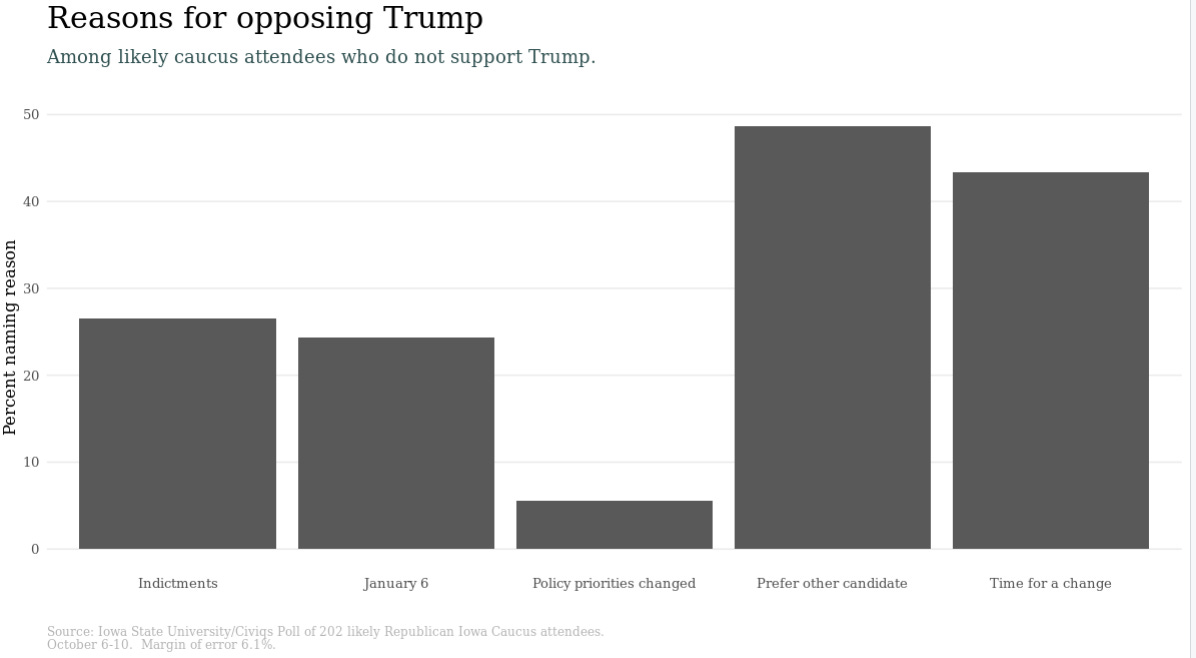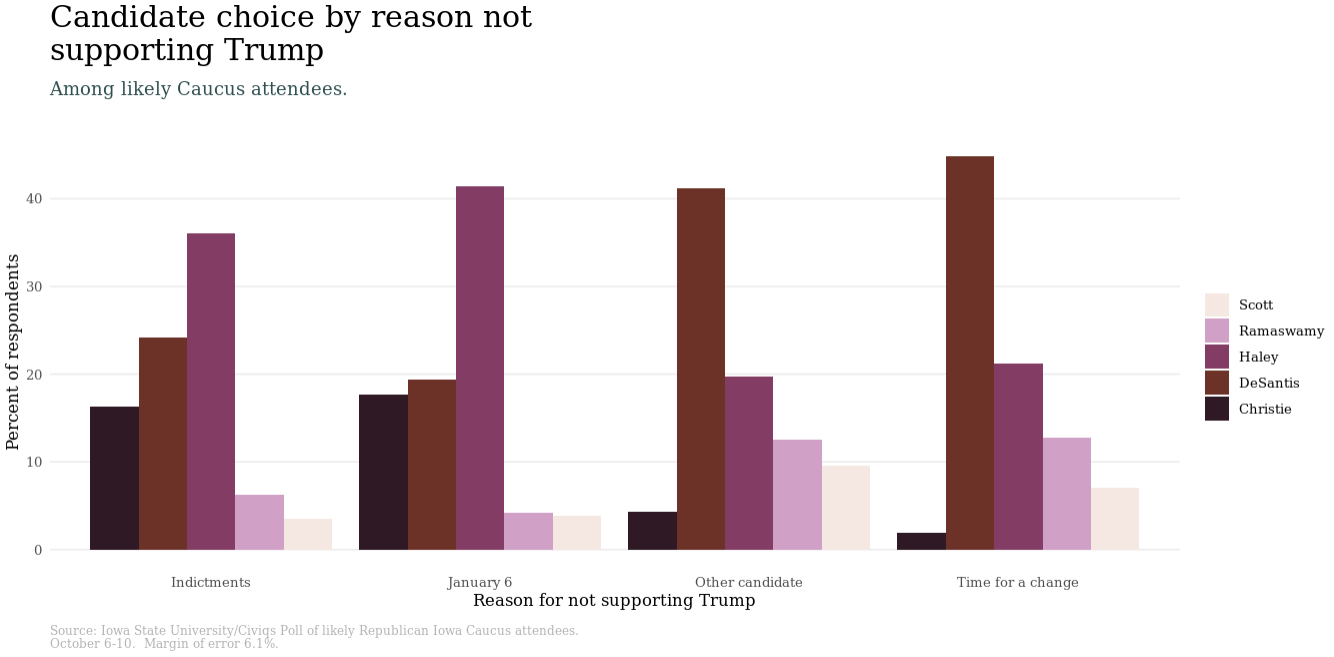Donald Trump is well-positioned to win the Republican nomination for president. As of November 13th, the 538 polling averages have him at 56.6 percent nationally, more than 40 points ahead of Ron DeSantis. In Iowa, we’ve been conducting monthly polls of likely caucusgoers and our most recent poll has Trump in the lead with 54 percent, followed by DeSantis at 18 percent.
There are a few ways to look at this lead. First, from a pure horserace perspective, this is Trump’s race to lose. It will require a massive shake-up among Iowans for him to not win the Caucuses. Second, and more important to us, is what this tells us about Trump’s status as a party leader and the nature of the divides among Republican rank-and-file voters (at least in Iowa). Most of the coverage and discussion around the nomination campaign emphasizes the size of the lead and the likelihood of his nomination. Here, we want to ask: If Trump is the leader of the Republican Party and in some ways the incumbent in the race, why isn’t he doing better? What is leading about half of likely caucusgoers, almost all of whom voted for him in 2020, to oppose him this cycle?
Our answers to these questions are based on our survey of Iowans on October 6th-10th. We partnered with Civiqs to survey 1,016 Iowans with an oversample of likely caucusgoers. This was the second of five planned monthly surveys and a large proportion of the respondents re-interviewed every month. In addition to the basic horse race questions, we included several questions designed to gauge how potential Iowa caucusgoers are thinking about Trump in the context of the modern Republican Party.
Is it still Donald Trump’s party?
Since former President Trump won the 2016 election, he has been cast as the leader of the Republican party. Sitting Presidents are typically regarded as the leaders of the party, but Donald Trump’s leadership might be more comparable to a takeover; it is not the Republican Party, but Donald Trump’s Republican Party. There is undoubtedly a significant portion of the GOP that has become a solid base of reliable Trump voters. Again, this is only 55 percent of likely caucusgoers. Barely receiving half of the party’s support would suggest that if Trump is a leader, he’s a relatively weak one, especially considering the support that he received in previous elections.
We asked some retrospective questions to try to gauge how widespread support of Trump had been among our respondents. For instance, we asked who the respondents supported in the 2016 Republican Caucuses. As a reminder, Trump did not win that year; Ted Cruz won the Iowa Caucuses with the support of about 28 percent of caucus-goers to Trump’s 24 percent. In our survey, however, 60 percent of Republicans and 30 percent of Independents say they supported Trump in the 2016 Iowa Caucuses. (We chalk this up to the respondents “misremembering” their 2016 preferences.)
Meanwhile, a full 90 percent of Republicans and 55 percent of Independents we surveyed report supporting him in the 2020 general election, but only 50 percent are backing him now. Only 73 percent of the potential caucusgoers who reported that they supported Trump in the 2016 general election are supporting him for 2024. This seems particularly surprising. A number of these respondents likely did not actually support Trump in 2016 but are psychologically committed enough to him to say that they did. It would be reasonable to assume that if someone were in that position, they would still support him for the nomination in 2024, but one out of four do not.
We have one other piece of evidence that leads us to ask why isn’t Trump doing better. He compares unfavorably to other candidates who had a similar status entering the race. Trump’s status as a former president in the campaign is unusual in the modern nomination system. He isn’t exactly an incumbent, but that might be a relevant comparison group. In contrast to Trump receiving around 50 percent of the support, Jimmy Carter received 59 percent in the 1980 Iowa Caucuses. The Republicans did not hold Caucuses in 1992, but George H. W. Bush received 53 percent of the vote in the New Hampshire primary. These results were seen as serious warning signs for the incumbents, even if they ultimately won their party’s nomination. Trump is on pace to do about as poorly.
If Donald Trump is both the leader of the party and the de facto incumbent, why is he barely receiving half of the party’s support? Why has he lost support within the party, and, who are those voters supporting instead?
We tried to answer these questions by asking respondents why they were not supporting Donald Trump. In these analyses, we are only including those who reported that they are probably or definitely going to attend the Caucuses and are not supporting Donald Trump. We asked these people: “Not every Republican is supporting former President Donald Trump. If he is not your first choice of a candidate, why not?”. The options were:
The 91 state and federal indictments
The January 6th riots
It is time for a change
I like one or more of the other candidates better
My policy priorities have changed
Respondents could select all that applied.
Of likely caucus attendees not supporting Trump, 49 percent reported liking another candidate better, 43 percent responded it is time for a change, 27 percent said the indictments, 24 percent said January 6th, and six percent said their policy priorities had changed. Setting aside the policy priorities answers, you can think about the left two bars as capturing respondents who answered that they opposed Trump because of things that he did. The two bars on the right are respondents who are expressing opposition for reasons beyond Trump’s actions.
Who are voters supporting instead?
Do these differences manifest in who the respondents are supporting? When looking at candidate choice by the reason(s) a respondent is not supporting Trump, a clear pattern emerges. Those who say they are not supporting Trump because of his actions (the indictments or January 6th) are supportive of Haley or Christie to a lesser extent. Respondents who say they are opposed to Trump for reasons other than Trump’s actions (they like another candidate better or that it is time for a change) are largely supportive of DeSantis, with Ramaswamy and Scott doing better with these Iowans.
This suggests that those supporting candidates other than Trump are doing so for fundamentally different reasons. While this certainly speaks to the disunity within the Republican party, it also indicates that it may be difficult for any of these candidates, but particularly DeSantis or Haley, to coalesce support from voters who don’t support Trump. If these are two distinct groups of caucusgoers, it will be difficult for either candidate to build an effective coalition.
These patterns also show up in a series of other questions we’ve asked in the first two waves of our survey. Our poll also asked respondents about the outcome of the 2020 election: 11 percent said Joe Biden won a fair election, 30 percent said Joe Biden won the election, but there were some irregularities, and 60 percent said Donald Trump won the election but had it stolen from him. Those who think the election was stolen from Trump support Trump overwhelmingly (75 percent). However, those who think Biden won with some irregularities support DeSantis (32 percent), while Haley receives support from those who think Biden won fairly (42 percent).
A similar story emerges regarding the investigations into Trump. We asked for respondents’ views about the many indictments that Trump faces. 11 percent responded that Trump has committed serious federal crimes, 27 percent said Trump did not commit serious crimes but did do something wrong, and 57 percent said Trump did not do anything wrong. Those who think Trump did nothing wrong support Trump (80 percent). However, those who think he did something wrong but did not commit serious crimes support DeSantis (40 percent), and those who think he did commit crimes support Haley (41 percent).
What does this all mean?
The main conclusion we reach from these results is that there are some underlying factions among Republican voters. As the field continues to winnow, it seems unlikely that Republicans who do not support Trump will simply fall in line behind one of the remaining candidates. The divided field continues to be a strength for Donald Trump. Finally, it remains an open question just what the Republicans who are not supporting him now will do if Trump is the nominee. It seems likely that Republicans who are not supporting Trump in the Caucuses for reasons beyond Trump’s actions (time for a change or like another candidate better) will fall in line in November 2024. The other group who reported opposing Trump because of his actions (indictments or January 6th) may face a real dilemma if he is the nominee.
















This is very interesting research. I will certainly cite it in my next piece about the caucuses.
“Of likely caucus attendees not supporting Trump, 49 percent reported liking another candidate better, 43 percent responded it is time for a change, 27 percent said the indictments, 24 percent said January 6th.”
I know that respondents were allowed to select more than one option, but it feels like the obvious divide between these reasons is that the first two imply that the respondent would still vote for Trump against Biden, while the latter two imply that the respondent would vote for Biden over Trump.